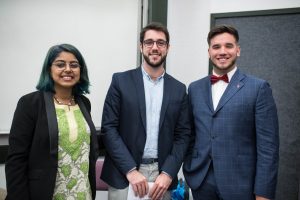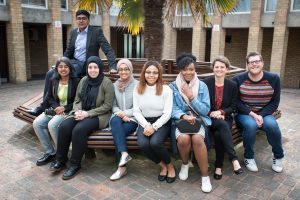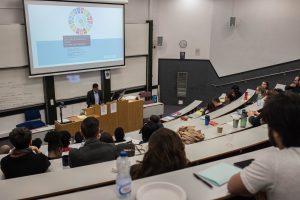This year’s Postgraduate Conference “Law And Millennium Goals: No One Left Behind!” focussed on the 17 Sustainable Development Goals initiated by the United Nations.
After weeks of preparing and organising, we (in the student conference committee) were delighted to receive responses to a Call for Papers from countries throughout the Commonwealth system, from Trinidad and Tobago to Belgium. Together with Kent Law School Senior Lecturer Dr Sophie Vigneron, we finally welcomed participants to Kent’s Canterbury campus on 4/5 June.
Kicking off the conference, Dr Vigneron delivered an opening statement outlining the 17 Sustainable Development Goals that countries adopted in 2015. Goals such as ending poverty, protecting the planet, and ensuring prosperity for all were a few named on the agenda which had a hopeful achievement year of 2030. “To accomplish this,” The United Nations states, “Everyone would have to do their part. Governments, the private sector, civil society, and even ordinary people, like us.” Prior to presenting, participants submitted papers which were read and discussed by the conference committee who sorted papers into panels. Participants were asked to create a PowerPoint presentation to aid them in presenting their papers. Each presenter was allotted 15 minutes to discuss their findings, and took part in a Q&A session after the end of each panel.
Our first panel, chaired by Dr Martin Hedemann-Robinson, was exclusively on environmental issues. Participants from Birkbeck University of London, Coventry University, and Kent discussed their findings on various issues from e-waste to effective legal environmental frameworks and recycling policies in the European Union. Concluding the four presentations in this panel, the audience asked questions, made comments, and provided feedback to their findings. Everyone is affected by the environment and we must ensure we protect her and follow a path of efficient sustainability, which as a race, we have not done in the past.
The second panel of the first day was focused on Human Rights and chaired by Dr Vigneron. This eye-opening panel had participants from the University of East Anglia, Kent (both from our centre in Belgium and our campus in Canterbury), and Queen Mary University. Their presentations ranged from democratic policing to women’s rights. This emotional panel provided light on injustices throughout the world, and how we can all do better. As Nelson Mandela has stated, “To deny people their human rights is to challenge their very humanity.”
The last panel was chaired by Dr Celine Tan, and surrounded issues concerning international trade and sustainable development. This informed panel had participants from Kent and Queen Mary’s Institute in Paris. It saw presentations on the reconciliation of large corporations, with wide shareholder bases, and environmental sustainability through Corporate Social Responsibility (CSR). Our last presenter looked at the implementation and implications of the 2030 SDGs in a major international trade centre, the Niger Delta region in Nigeria. The panel was especially insightful for the ways in which trade can aid sustainable development.
The day ended with the prestigious Clive Schmittoff Lecture which was delivered by Dr Tan from the School of Law, Warwick. The Lecture was eloquently delivered, touching on the privatisation of aid through the outsourcing of development. The issues raised picked up on regulatory and accountability problems arising from this shift to private actors from public actors. It was both topical and engaging.
After coffee and tea, the second day was underway beginning with Dr Gbenga Oduntan chairing the law and development panel. Presentations were on Lex Merchatoria and how it can be applied to commercial space flights, as well as global policymaking and strong Institutions in the Caribbean regarding SDGs. This innovative panel created discussion on how law can be used to develop a sustainable future.
The final panel was chaired by PhD candidate Tristian Webb regarding economic and social change. The two participants were from Birkbeck University and Kent’s Brussels School of International Studies. Their topics ranged from discussing SDGs on inequality and poverty to private sector activism, such as pro bono in South Africa. The participants engaged the audience and requested feedback on their findings, which led to a discussion on how others would approach their topics.
Concluding the panels, the conference moved towards the final segment, a round table discussion on sustainable development. The questions to be discussed were on single-use plastics, how to empower low socioeconomic groups, how to empower minority groups, and how to balance economic development with sustainable development goals. The ideas of the participants were jotted down and discussed in detail thereafter.

The time had come to congratulate the winners and runner-up candidates for internal (Kent Law School) and external papers and presentations. From Kent Law School, Anamika Misra won first place, followed up by Jaime Erasun. Miss Misra wrote and presented on human rights law, titled “The Missing Human in Human Rights Law.” Mr Erasun wrote and presented on inequality and poverty, titled “SDGs: Inequality and Poverty.” For extrernal papers, Mette Grunløse won first place, followed up by Anthony Honorowski Jr, both from Queen Mary University of London. Miss Grumløse wrote and presented on international human rights law, titled “Is International Human Rights Law Structurally Incapable of Advancing the Interests of Women?” Mr. Honorowski wrote and presented on commercial space law, titled “Space Law & Lex Mercatoria: On the Application to Commercial Space Flights.”
After acknowledging the outstanding participants in the 6th annual Kent Law School Postgraduate Conference, the concluding remarks were made by Osama Aftab Memon. A vital member to the preparation and organizing of the conference, Mr. Memon spoke of the importance of sustainability and development in the future, and how we can each help to make a difference. He concluded by thanking all of those who participated, as well as those who chaired the panels and helped make this conference a success.
Written by Joseph Carr and Lilianne Isebor


